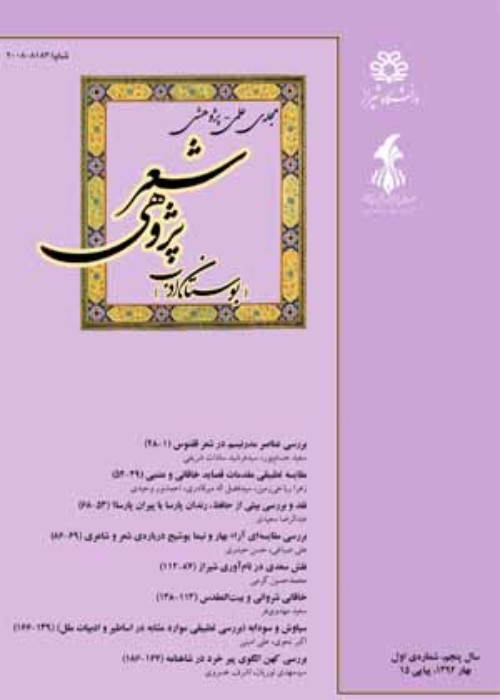Textual criticism of Delgoshanameh by Arjmand Kashmiri
The religious epics are historical epics that narrate on literary levels the lives of religious leaders, rituals and events, and the conflicts between religions. Islam and Shiism provide valuable sources of inspiration for Persian poets in writing religious epics. A great number of these works deal with the past wars that, since the advent of Islam, have been associated with the confrontation between Right and Wrong, and have been intended to demonstrate Islamic values and moral norms. The Shiite epics are mostly centered around Imam Ali and Imam Hussein.These epics are known as Alinameh and Hosseiniehnameh, respectively. Among the most valuable and magnificent religious epic poems, we mention Delgoshanameh by Arjmand Kashmiri, dealing with the Mukhtar Uprising, which has not been analyzed, corrected, studied and recognized thoroughly yet. According to some sources, this work is credited to Azad Belgrami, but after examining the earlier and later sources, the attribution is found to be incorrect, and the work belongs to Arjmand Kashmiri. Delgoshanameh recounts Mukhtar's story in a precise and detailed manner.
The authors of this research looked at the textual aspects of Delgoshanameh, which is one of the lesser-known works in this field. There are various points to be observed in attributing the work to two poets (Azad Kashmiri and Azad Belgrami), secondly, the poet's condition should be examined as thoroughly as possible, and thirdly, concerning the work and its extant versions, the text's content and linguistic features, as well as its most important aesthetic features, should be scrutinized and analyzed. The current study was conducted using the bibliographic approach and was based on qualitative content analysis and description. The literature review can be summarized as follows:Aidenloo (2007) quoted a verse from Azad Kashmiri on Zulfiqar in his article “Zulfiqar, from history to myth (narrative characteristics of Zulfiqar in Iranian culture and literature)”. While introducing poetry books of Persian Mokhtarnamehs ( Poetry that chronicles the story of Mukhtar's uprising is sometimes published under the general title “Mukhtarname”), Qaffari (2019) mentioned Delgoshanameh and briefly debated the accuracy of attributing the work to Azad in his piece "A Look at Mukhtarnamehs”. Abdollahi (2011) briefly referred to Delgoshanameh in the articles “Supplementary version of Heydari’s attack or a single work” (2011) and “Introduction of epopee of battles”(2012).
Mirza Arjmand Mohammad Khalaf Abu al-Qasim ibn Abd al-Ghani Beyg Azad Kashmiri (1722 AD) was the son of "Qabul" Kashmiri who taught him the fundamentals of science and literature. In memoirs and books on literary history, little is known about him. His Iranian and Tehrani origin is confirmed in the work's concluding stanza. His pseudonym was “Azad” at first, but he eventually altered it to “Jonoun”. They erred in assigning Delgoshanameh to Azad Belgrami due to the resemblance of the pseudonym between Mir Gholam Ali Belgrami and Mirza Arjmand Mohammad Khalaf Abolghasem Abdul Ghani Beyg, both of whom had “Azad” nicknames, from ancient recollections to certain current sources. Delgoshanameh was written in 1709 and has around 16,500 verses. Delgoshanameh is composed in the form of Bahre Moteqareb. This collection begins with Tahmidiyeh) a preface relating to praising god) following Ferdowsi's Shahnameh and the prevalent style of Persian Mathnavi. Around 1709, Azad began writing the collection, which recounts the events of the Mukhtar Uprising, and finished it in six years. With the highest fidelity and attention to detail, Arjmand attempted to portray the most exact and full sequence of this significant Shiite event for the readers. Due to the theological and historical aspects of the narration, as well as the Shiite philosophy that pervades the work, the poet expressed his deep spiritual anguish over the Ahl Bayt's (prophetic household) sufferings in a language full of sorrow. The speech's epic and heroic tone, particularly in the disputes between the heroes and the descriptions of the battlefields, is reminiscent of Ferdowsi's Shahnameh's glorious descriptions and tone. The regretful and heartfelt prayers of Arjmand Kashmiri, which are described in the opening and at the end of the book, are one of the special and noticeable elements of the Shiite Mathnavi of Mokhtarnameh. Arjmand Kashmiri dedicated verses to advise and words of wisdom while recounting in the framework of Shahnameh and in the style of Ferdowsi’s speech. However, Arjmand’s approach in these words of wisdom, which is different from Ferdowsi's brievity, is verbosity, an example of which is quoted below. More than 10 unique and verbose saqinamehs have been written in Delgoshanameh. After all, the inclusion of this type in the story's narration resulted in some spiritual positions. In terms of style, it is important to mention that the work's language is relatively beautiful and strong. There are many allusions and references to the story and the Qur'an and narration in the book due to the religious context and the excellence of the story.
Delgoshanameh is written by Mirza Arjmand Azad Kashmiri that has been mistakenly credited to Gholam Ali Azad Belgrami for the first time in the Rio list. The Bankypour Library Manuscript List is the oldest source that warns of this erroneous attribution. Six manuscripts of Delgoshanameh can be found in Iranian and international libraries. Only the copy in the National Library of Iran contains the complete text of the work and is of aesthetic worth among all the copies available in Iran. In Iran, other copies are incomplete.Delgoshanameh's historical narrative is founded on Atta Ibn Hussam Waez's Mokhtarnameh in prose in most of the collection’s stances. Mukhtar's religious story has been portrayed in an epic tone by Arjmand Kashmiri. Battle scenes, dialogues, heroics, mass battles, and hand-to-hand fighting rites are all described in detail. Sometimes, between the narration, there are some pieces of advice which are relatively verbose. Shahnameh's effect on the work is undeniable. In Delgoshanameh, there are numerous saqinamehs.Saqinamehs appear at the opening of stories and at the triumphant conclusion of Imam Hussein's (AS) punitive forces. Saqinamehs are partly similar to Tajdid-e-Motale Qasayed and give a lyrical taste to the narration.
- حق عضویت دریافتی صرف حمایت از نشریات عضو و نگهداری، تکمیل و توسعه مگیران میشود.
- پرداخت حق اشتراک و دانلود مقالات اجازه بازنشر آن در سایر رسانههای چاپی و دیجیتال را به کاربر نمیدهد.



